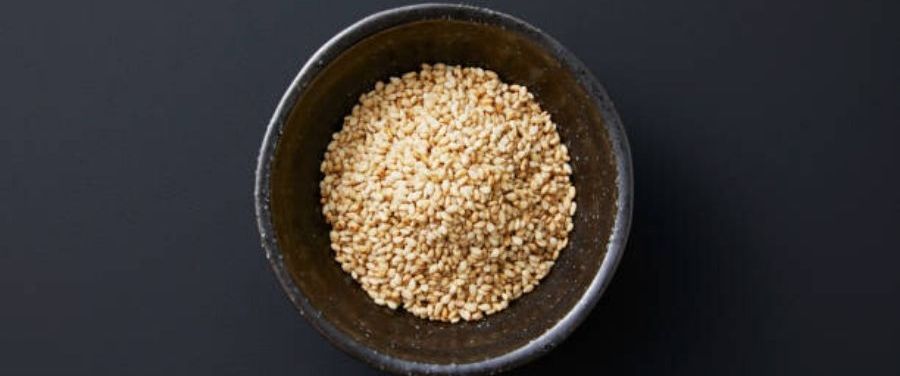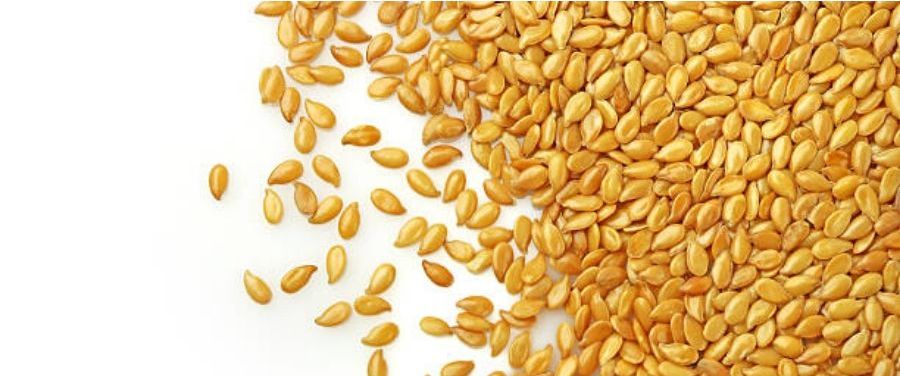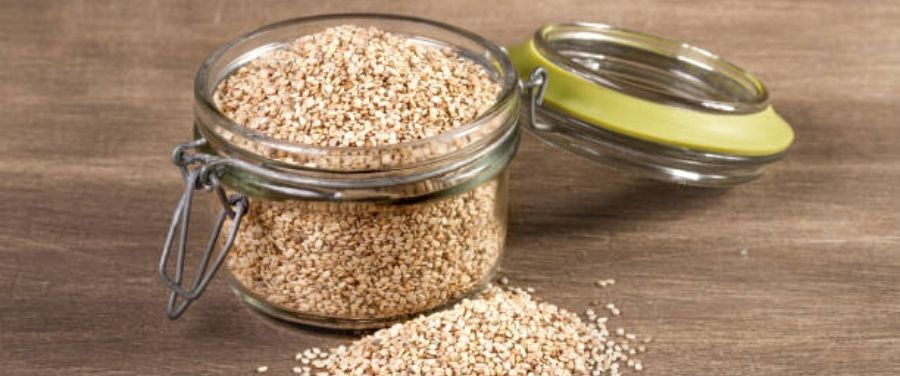OVERVIEW:
Sesame seeds originate from a plant of the genus Sesamum and its scientific name is Sesamum Indicum. Sesame seed is considered to be the oldest seed oil crop in the world and has been cultivated for over 3500 years. It is most commonly grown in Africa and India.
Sesame has been an important part of food for centuries. Many people consume it because of its taste, some because of its nutritional properties.
Many people are still not aware of its medicinal properties. Its intake provides many benefits related to nutrition as well as keeps your body healthy. Sesame seeds are mainly of three colors — white, red and black. White and black sesame seeds are used in most of the families. It is consumed mostly in winter.
Sesame seeds are very small, which are 3-4 millimeters long and 2 millimeters wide. You can see the use of sesame seeds in almost all traditional dishes.
Its plant has a strong smell and it is about 30-60 cm tall. Sesame is the seed inside the pod that comes on the plant. Its cultivation is considered suitable from August to October.

SESAME SEEDS: NUTRITIONAL VALUE
One ounce (approx 28g) of whole sesame seeds contain about —
- 158 calories (8% DV)
- 7.2 g total carbohydrate (2% DV)
- 3.9 g fiber (16% DV)
- 13.4 g total fat (21% DV)
- 102 mg total omega-3 fatty acids
- 5784 mg total omega-6 fatty acids
- 4.7 g protein (9% DV)
- 2.5 IU vitamin A
- 27.4 mcg folate (7% DV)
- 277 mg calcium (28% DV)
- 4.1 mg iron (23% DV)
- 99.7 mg magnesium (25% DV)
- 179 mg phosphorus (18% DV)
- 133 mg potassium (4% DV)
- 2 mg zinc (13% DV)
- 0.7 mg copper (35% DV)
- 0.7 mg manganese (35% DV)
- 1.6 mcg selenium (2% DV)
*DV stands for daily value.
HEALTH BENEFITS OF SESAME SEEDS:
The major health advantages of sesame seeds may include —
1. Reduces High Blood Pressure:
Natural oils found in sesame seeds help in reducing high blood pressure. It reduces stress on your cardiovascular system and helps to prevent various heart problems. In addition, magnesium is known to reduce hypertension and sesame seeds are loaded with this essential mineral. With this, you get 25% of daily requirement of magnesium.
2. Helps to Prevents Cancer:
Essential vitamins and minerals are found in sesame seeds. The antioxidants present in these seeds are known to reduce the risk of cancer. Seeds also contain phytate (phytic acid) which acts as an antioxidant and reduces the effect of free radicals.
These small seeds are effective in reducing many forms of cancer and many other problems like heart diseases, premature aging and cognitive dysfunction. Sesame seeds are also known to reduce leukemia, breast cancer, lung cancer, pancreatic cancer, colorectal cancer, and prostate cancer.
3. Reduce the Risk of Diabetes:
Elements present in the seeds, including magnesium, are known to reduce diabetes. In addition, it has been shown that sesame seed oil can positively influence the effects of various diabetes medications in patients with type-2 diabetes.
It improves the efficiency of the drug and regulates the levels of insulin and glucose in the body which helps in normalizing the symptoms of diabetes.
4. Good for Bones:
Sesame seeds contain essential minerals like zinc, calcium and phosphorus, which can be a great option for the health of your bones. These minerals help to build new bones and strengthen and repair them.
5. Boosts Digestion:
Sesame seeds are rich in fiber. Fiber is an important element to keep digestion healthy, as it helps the intestines to perform their functions. It can reduce problems such as constipation, as well as reduce the chances of diarrhea and gastrointestinal diseases and cancer.
Fiber helps to flush out dangerous LDL cholesterol from the arteries and blood vessels, reducing the chance of atherosclerosis, heart attack and stroke, etc.
6. Reduce Inflammation:
The high amount of copper present in sesame seeds is known to reduce inflammation in joints, bones, and muscles, thereby reducing the pain caused by arthritis. In addition, copper is an essential mineral for strengthening blood vessels, bones, and joints.
Therefore, the proper amount of copper in the body helps to increase blood circulation and ensures that the whole body’s organ systems continue to get enough oxygen to function properly.
7. Promote Oral Health:
Sesame seeds and its oil help to maintain oral health by removing dental plaque and whitening your teeth. Use sesame seed oil for oil pulsing. For this, you roll sesame seed oil in your mouth.
It helps to reduce the presence of streptococcus mutans (a common bacterium that can be dangerous to your oral cavities).
8. Reduce Anemia:
Sesame seeds, especially black sesame seeds, are rich in iron. Therefore, people suffering from anemia are advised to consume it. Sesame seeds contain an organic compound called sesamol. It protects DNA from the harmful effects of radiation and you can come under the influence of radiation from many accidental sources — such as chemotherapy and radiotherapy (during cancer treatment).
9. Promote Heart Health:
Sesame seed oil prevents the arteries from hardening (atherosclerosis) and is therefore beneficial for heart health.
It contains an antioxidant and inflammatory reducing compound called sesamol, which has anti-atherogenic properties. Thus, it improves heart health. Sesame seeds contain monounsaturated fatty acids and oleic acid, which help to reduce bad cholesterol (LDL) and increase good cholesterol (HDL) in the body. It also reduces the risk of stroke.
10. Reduced Risk of Arthritis:
Sesame seeds contain copper, a mineral that is important for antioxidant enzyme systems. Thus it is very useful in reducing arthritis and inflammation associated with it.
In addition, this mineral provides strength to blood vessels, bones and joints. The magnesium present in the seeds can also help to prevent asthma and other respiratory disorders.
11. Prevents Depression and Anxiety:
Sesame seeds contain many nutrients that have stress-relieving properties. Minerals such as magnesium and calcium present in it act as an antispasmodic (a drug used to relieve or prevent cramps), regulating muscle function.
Thiamine (vitamin B1) has calming properties that aid in nerve functions. Lack of this vitamin can cause muscle spasms and depression.
Tryptophan is an essential amino acid that reduces pain and regulates sleep patterns and mood. Anxiety and depression can occur due to insufficiency of serotonin production and transmission in the brain. In this way it works as an antidepressant.
12. Reduce Cholesterol:
Black sesame seeds are beneficial in reducing cholesterol levels. Seeds contain two substances called sesamin and sesamolin, which are a group of fibers called lignans.
The effects of lignans reduce cholesterol as they are rich in dietary fiber. Seeds also have the highest phytosterols which is beneficial in lowering cholesterol levels.
13. Promote Eyes Health:
According to traditional Chinese medicine, there is a strong connection between internal organs (such as the liver) and external organs (such as the eyes). The liver stores blood and the liver sends blood to them to support the functions of the eyes.
Black sesame seeds are beneficial for the liver because they increase blood throughout the liver, which makes the eyes healthy. The therapeutic benefits of black sesame seeds help in the treatment of these problems —
- Blurred vision
- Eye fatigue
- Eye dryness
14. Sesame Seeds for Hair Growth:
Sesame seeds contain essential fatty acids such as omega-3, omega-6 and omega-9 which help to grow hair.
Sesame seed oil conditioning the hair and keeps the scalp healthy, in this way it helps to lengthen your hair. Regular massage with warm sesame oil increases blood circulation.
SIDE EFFECTS OF SESAME SEEDS:

Apart from a lot of health advantages, sesame seeds also have many side-effects —
- Excessive consumption of sesame seeds can irritate stomach and colon.
- These mild sesame seeds are full of calories and saturated fat. And if you are thinking to lose weight, then you should avoid excessive intake of them. If you regularly consume more sesame seeds, it can also contribute to weight gain.
- Another common side effect of consuming sesame seeds is allergy. Many individuals may be allergic to its intake. Different types of allergies such as digestive problems, swelling to the eyes, runny nose, asthma, etc. can occur.
- Many people may become a victim of appendix infection due to the excessive intake of sesame seeds. Occasionally, some seeds may get trapped in the organ, which can certainly be serious with mild infection.
- According to scientists, sesame seeds have great laxative properties. It means, excessive intake of sesame can cause diarrhea. Therefore, consume its limited quantity.
- Sesame seeds can have some adverse effects on your skin if you consume them in large amounts. Excessive intake can cause skin rashes with itching and redness.
- Many of us use black sesame to ensure the health of our hair. But its excessive intake can completely reverse the results. This causes hormonal imbalances, which make the scalp oily and dry hair follicles. Consequently, the rate of hair loss increases substantially. It can also cause baldness.
- It is believed that consuming sesame seeds during the first trimester of pregnancy is bad for health. Sometimes an abortion can also occur.
FINAL WORDS
Sesame seeds are good for your overall health. But, just keep in your mind that its excessive consumption may cause harm.
REFERENCES:
- Kamal-Eldin A, Moazzami A, Washi S. Sesame seed lignans: potent physiological modulators and possible ingredients in functional foods & nutraceuticals.. 2011 Jan;3(1):17-29. PMID: 21114470
- United States Department of Agriculture. Basic Report: 12023, Seeds, sesame seeds, whole, dried. National Nutrient Database for Standard Reference Legacy Release; Agricultural Research Service
- Gouveia Lde A, Cardoso CA, de Oliveira GM, Rosa G, Moreira AS. Effects of the Intake of Sesame Seeds (Sesamum indicum L.) and Derivatives on Oxidative Stress: A Systematic Review.. 2016 Apr;19(4):337-45. PMID: 27074618
- Niti Pathak, A.K. Rai, Ratna Kumari, and K.V. Bhat. Value addition in sesame: A perspective on bioactive components for enhancing utility and profitability. 2014 Jul-Dec; 8(16): 147–155. PMID: 25125886
- Cooney RV, Custer LJ, Okinaka L, Franke AA. Effects of dietary sesame seeds on plasma tocopherol levels.. 2001;39(1):66-71. PMID: 11588904
- Barbosa CV, Silva AS, de Oliveira CV, Massa NM, de Sousa YR, da Costa WK, Silva AC, Delatorre P, Carvalho R, Braga VA, Magnani M. Effects of Sesame (Sesamum indicum L.) Supplementation on Creatine Kinase, Lactate Dehydrogenase, Oxidative Stress Markers, and Aerobic Capacity in Semi-Professional Soccer Players. 2017 Mar 31;8:196. PMID: 28408889
- Visavadiya NP1, Narasimhacharya AV. Sesame as a hypocholesteraemic and antioxidant dietary component.. 2008 Jun;46(6):1889-95. PMID: 18353516
- Lee CC, Chen PR, Lin S, Tsai SC, Wang BW, Chen WW, Tsai CE, Shyu KG. Sesamin induces nitric oxide and decreases endothelin-1 production in HUVECs: possible implications for its antihypertensive effect.. 2004 Dec;22(12):2329-38.PMID: 15614027
- Self Nutrition Data. Seeds, sesame seeds, whole, roasted and toasted Nutrition Facts & Calories
